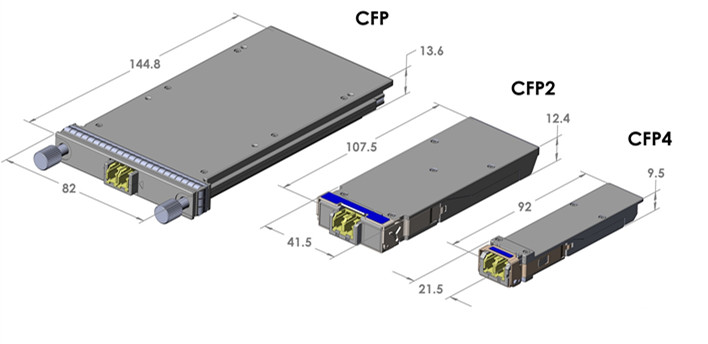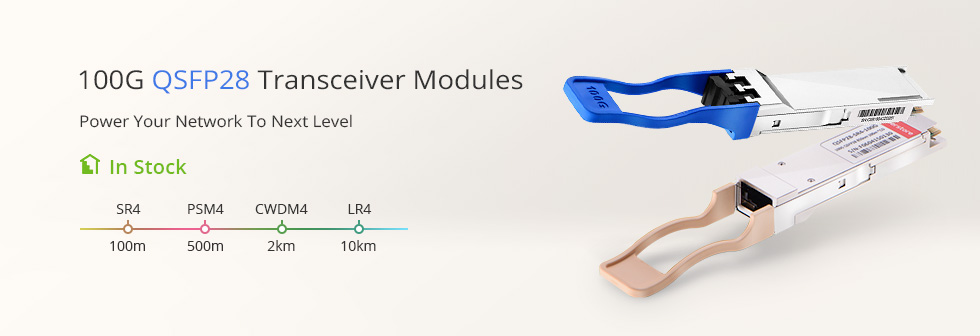With
bandwidth demands keep growing, network service providers are looking
at 40G or 100G to accommodate the constant traffic surge. For 40G QSFP+
transceivers, they are interfaced with MTP/MPO or LC connectors, which
has been introduced in a previous post: 40G Transceivers With MTP/MPO Interface vs. 40G Transceivers With LC Interface. So this article will introduce 100G transceivers (CFP/CFP2/CFP4/QSFP28) which have different interface types.
100G Transceivers Standards
The
100G optical transceiver market is fragmented by many different
implementations. Besides the IEEE standards, there are also 100G
transceivers defined by MSA. The following table lists part of the 100G
standards.

From
the table above, we can see that there are three different interface
types for 100G transceivers—24-fiber MPO, 12-fiber MPO and LC duplex.
The 100G transceiver with 24-fiber MPO interface uses 20 fibers to
transmit data, with 10 lanes at 10 Gbps per lane (10 transmit and 10
receive). The 100G transceivers with 12-fiber MPO interface use 8 fibers
to transmit, with 4 lanes at 25 Gbps per lane (4 transmit and 4
receive). This interface standard has been introduced alongside the 100G
QSFP28 transceivers to make 40G to 100G upgrade as seamless as
possible. And the 100G transceivers with LC interface work over
single-mode fiber cables for long-distance transmission.
100G Transceivers Types
After
knowing about the 100G transceivers standards, let’s move to the 100G
transceivers types. There are 100G CFP/CFP2/CFP4 and QSFP28
transceivers. CFP was designed after SFP, but is significantly larger to
support 100 Gbps. The electrical connection of a CFP uses 10 x 10Gbps
lanes in each direction (RX, TX). The optical connection can support
both 10 x 10Gbps and 4 x 25Gbps variants. With improvement in higher
performance and higher density, CFP2 and CFP4 appeared. While electrical
similar, they specify a form factor of 1/2 and 1/4 respectively in size
of CFP. CFP, CFP2 and CFP4 modules are not interchangeable, but would
be inter-operable at the optical interface with appropriate connectors.

The
100G QSFP28 transceivers offer 4 independent transmit and receive
channels, each capable of 25Gbps operation for an aggregate data rate of
100 Gbps. Among the various 100G transceivers, most of switch vendors
choose the QSFP28 transceivers, because they make deploying 100G
networks as easy as 10G networks, increasing density, decreasing power
consumption and decreasing your price per bit. It’s also notable that
the QSFP28 has the same physical size as the QSFP+ commonly used for 40G
traffic. This means that switch vendors can increase the traffic
throughput by a factor 2.5 without the need to redesign the front panel
of their switches.

Conclusion
100G
transceivers are boosting greatly for ever. Buying 100G transceivers is
imminent. Choose a reliable supplier and buy the quality 100G
transceivers right now. FS.COM has completed the inventory for 100G
transceivers and you can enjoy the same-day shipping. We highly
recommend the 100GBASE-PSM4 QSFP28 transceiver and 100GBASE-CWDM4 QSFP28
transceiver, which are affordable and can meet most of your network
demands. For more details about our 100G transceivers, please visit
www.fs.com.
Originally published: www.fiberopticshare.com/100g-transceivers-cfpcfp2cfp4-qsfp28.html
Well, that’s a good way to put it, nice insights, works great in clientele explanation and information resource option.
回复删除Cat5e Wiring Services